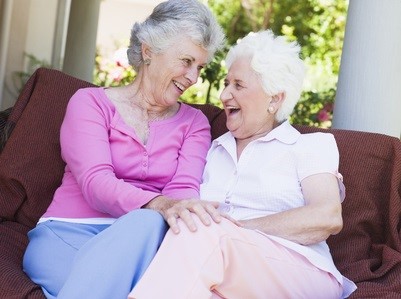
Recent estimates suggest that there are at least 1.5 million lesbian, gay and bisexual people 65 and older in the U.S., and this population will double by the year 2030 (SAGE). While confronted with the same challenges that all elders face related to aging, LGBT elders also face unique barriers and inequalities which can impact successful aging. Some of the primary issues that national advocacy organizations and studies have identified include:
Issues of economic security: For LGBT older adults, a lifetime of employment discrimination and other factors contributes to disproportionately high poverty rates. Major laws and social safety net programs fail to protect LGBT elders equally to their heterosexual peers, particularly in benefits access for same-sex couples.
Health disparities: LGBT older adults experience health disparities across four general areas: access to health care, HIV/AIDS, mental health, and chronic physical conditions. Health insurance coverage and financial issues may affect proper access to preventative care and ongoing health maintenance.
Social isolation and discrimination: LGBT older people are twice as likely to live alone, twice as likely to be single, and 3-4 times less likely to have children—and quite a number are estranged from members of their biological families. Living alone is one risk factor in isolation/depression and LGBT older people may also face isolation related to discrimination.
Discrimination and unmet needs within aging services: Many mainstream aging services do not account for special needs of diverse clients. Elders may also face discrimination from both service providers and other participants (i.e. residents in care facilities). For example, one study of LGBT seniors in long-term care facilities found that only 22% of respondents felt they could be open about their LGBT identities with facility staff, 89% predicted that staff would discriminate based on their sexual orientations and/or gender identities, and 43% reported instances of mistreatment. Additionally, many systematic issues in aging and healthcare programs as well as legal issues create special barriers to LGBT elders (ranging from Social Security and retirement benefits to Medicare/health insurance and all types of eligibility based on state marriage laws).
There are a number of issues we need to address societally and more specifically within aging services to better serve this growing population. It is vital that all seniors have resources they can trust to treat them with dignity and respect, to help them manage the challenges of aging.
Our next blog post will delve more specifically into eldercare planning issues and tips for LGBT elders and caregivers. Good planning and working with sensitive, experienced providers is essential. All elders need to get expert advice, but this is particularly important for LGBT elders in light of some of the key issues raised above and different legal and systematic challenges. If you need help with planning, assessments, advice or resources, give us a call today at 727-447-5845.
Aging Wisely:
Our ethics: Our professional geriatric care managers treat clients with respect, as complete individuals with their own history, narrative and unique cultural identity.
Our mission is to enable every individual we work with to live the most fulfilling life possible, focusing on their physical, mental, spiritual, family and financial well-being.
Resources:
SAGE (Services and Advocacy for Gay, Lesbian, Bisexual and Transgender Elders)
 Popular Downloads
Popular Downloads


 Get Our Newsletter!
Get Our Newsletter! Mission Statement
Mission Statement

